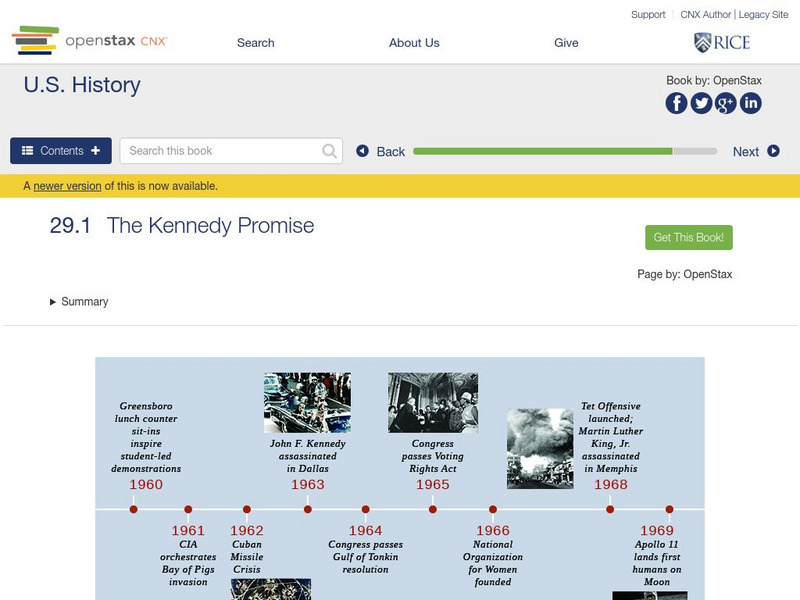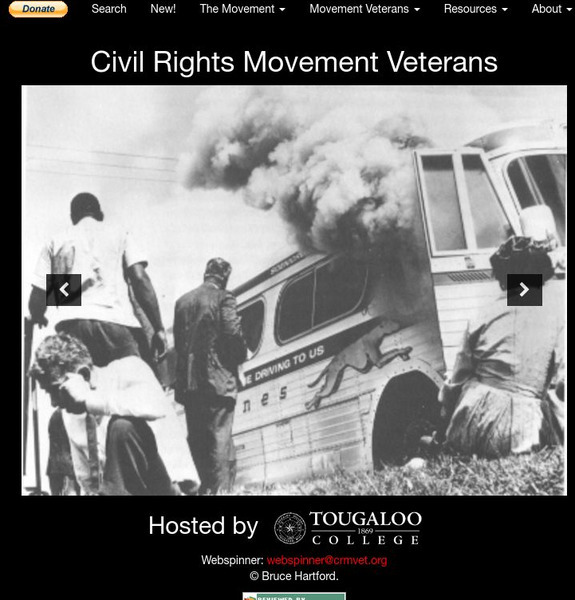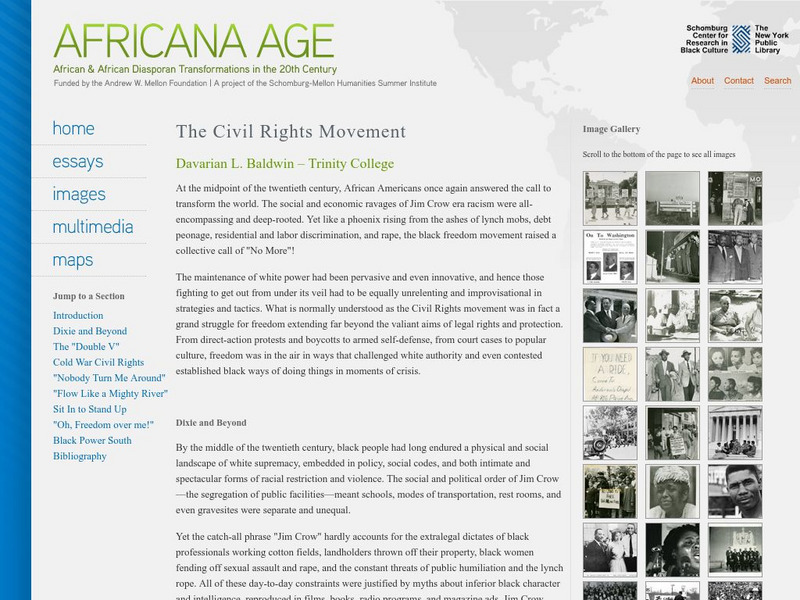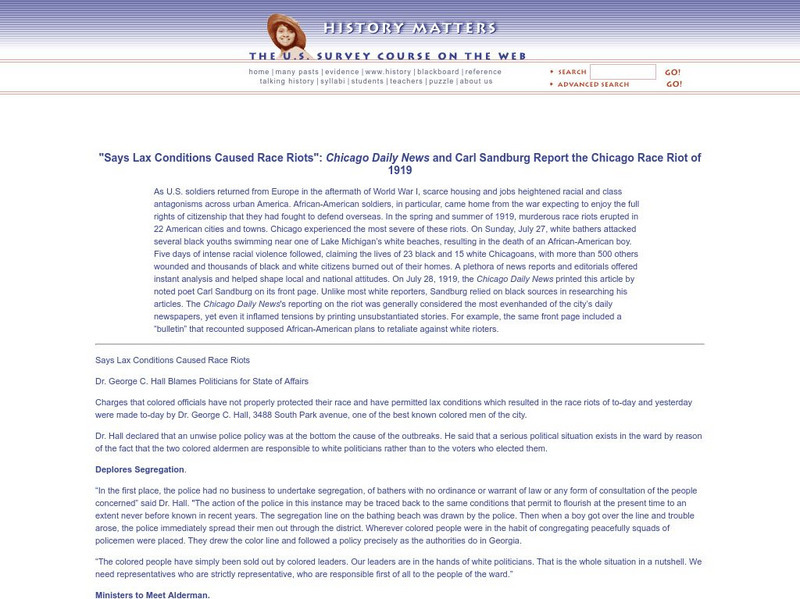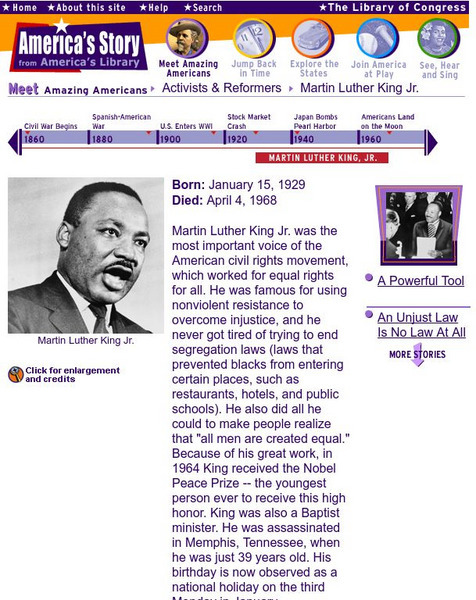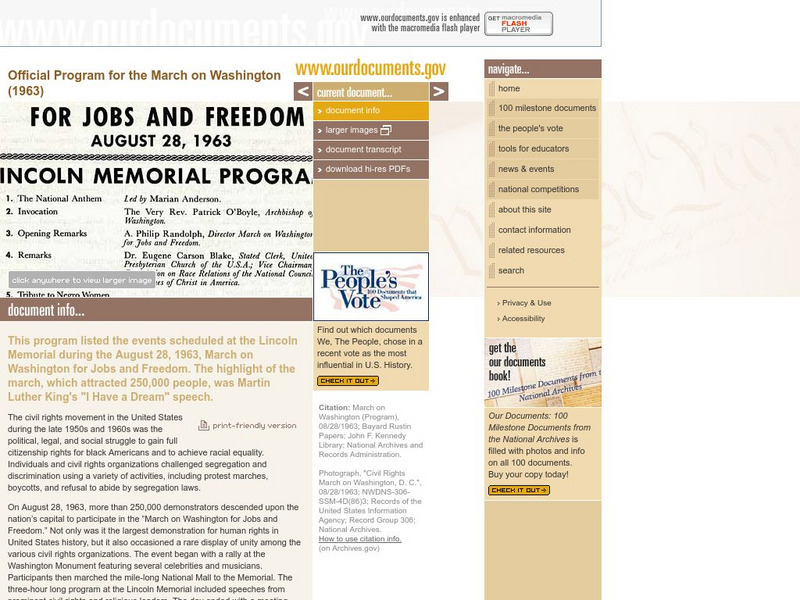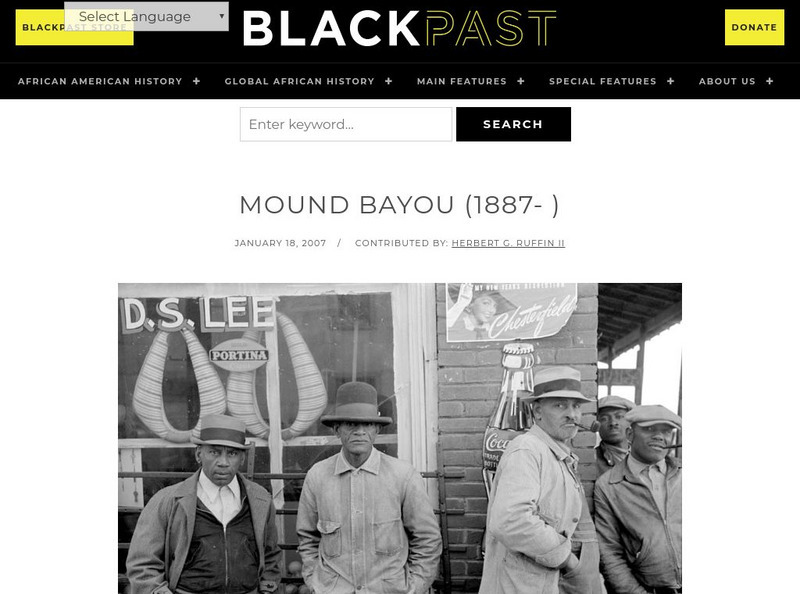Hi, what do you want to do?
Other
Historical Thinking Matters: Rosa Parks: Intro
Extensive teaching aid to help students understand the Montgomery Bus Boycott using primary sources such as letters, police reports, leaflets, and speeches. Includes many student activities and resources.
OpenStax
Open Stax: Contesting Futures: America in the 1960s: The Kennedy Promise
Discusses Kennedy's rise to power and the challenges he faced from within the government, his focus on foreign policy, the conflict with Cuba, American involvement in Vietnam, support for racial equality and civil rights, and Kennedy's...
University of Virginia
Miller Center at Uva: u.s. Presidents: Dwight Eisenhower: Domestic Affairs
President Eisenhower tried to follow a middle road in proposing and supporting domestic affairs during his presidency. Read about the policies he put forward. Read also about his dealing with Senator Joseph McCarthy, and his spotty...
Other
United Nations: Historical Images of Apartheid in South Africa
Follow the history of the apartheid government in South Africa, from its formation to racial discrimination to the efforts by the UN to abolish apartheid. An extensive gallery of captioned photos creates a dramatic visual history.
Other
Civil Rights Movement Veterans
Remembrances of Civil Rights Movement workers who were active in the 1960s and '70s. Excellent site to gauge the impact of the movement on the workers themselves. Information about the Movement with eyewitness stories, poetry,...
Other
Helium: The History of Apartheid in South Africa
Learn about Apartheid in South Africa, and what the main reasons were that worked toward it coming to an end. Very informative information.
Digital History
Digital History: To the Heart of Dixie
In the early 1960s civil rights activists put the ban on segregation to the test. In 1961, "Freedom riders," boarded buses headed south to test the federal ban on segregated travel. And in 1962, the University of Mississippi was ordered...
Alabama Learning Exchange
Alex: Out of the Night That Covers Me
Through the novel Out of the Night That Covers Me, students will explore the impact of racial segregation, family heritage, and the historical significance of pre-civil rights Alabama. This unit of study is recommended for students in...
Thurgood Marshall Website
Thurgood Marshall: The Bicentennial Speech: Remarks of Thurgood Marshall
Text of Thurgood Marshall's Bicentennial Speech given in 1987, in which Marshall pointed out the inadequacies of the U.S. Constitution in addressing civil rights and liberties.
Yale University
Yale New Haven Teachers Institute: Supreme Court Rules on School Desegregation
This thoughtful unit explores the history of school desegregation legislation, including a discussion of the impact of the Plessy v. Ferguson and Brown v. Board of Education decisions. A six-week plan of lessons, along with other sample...
University of Virginia
Virginia Center for Digital History: Television News of the Civil Rights Era
A rich collection of streaming video samples of television news footage from 1950 to 1970, along with an assortment of primary source documents, first-person accounts, a glossary of terms, and essays and analysis for learning about the...
South Carolina Educational Television
South Carolina Etv Commission: Celebrate Freedom: Tuskegee Airmen
A multimedia experience about the Tuskegee Airmen, an all African American flying squadron established in Tuskegee, Alabama in 1941. This exhibit celebrates the 60th Anniversary of the struggles and accomplishments of this group of...
Other
New York Public Library: Africana Age: The Civil Rights Movement
This is an extensive review of the Civil Rights movement from the 1940s to the 1960s. Read about the ways African Americans protested discrimination in employment and education over several years. Be sure to click on the images to find...
Curated OER
History Matters: "Says Lax Condidtions Caused Race Riots"
Read several articles from the Chicago Daily News on July 28, 1919, reporting on the various aspects of the Chicago race riots. One article, by Carl Sandburg, used sources from the black community.
University of California
History Project: Chicago Race Riot, 1919
This lesson for high school young scholars explores the race riot in Chicago in the summer of 1919. Students are asked to explain the reasons for the riot and address the questions in the lesson. Included are excerpts from 26 primary...
Other
In Pursuit of Freedom & Equality: Brown v. Board of Education of Topeka
Teachers and students can find a comprehensive summary of the Brown v. Board of Education of Topeka case. Learn about the myths and find out the truth. The activities offered are especially meaningful. Students can perform a...
PBS
The March on Washington and Its Impact : Lesson Plan
Learn about the social conditions in the United States that led up to the Civil Rights Movement. Also, explore peaceful resistance and the immediate impact of the march.
Library of Congress
Loc: America's Story: Martin Luther King
This article gives a brief overview of the life of civil rights leader Dr. Martin Luther King Jr. while discussing the concept of non-violent resistance.
US National Archives
Our Documents: Official Program for March on Washington(1963)
Contains a copy of the original program for the March on Washington that featured Martin Luther King. Provides a summary of the civil rights movement at that time.
US National Archives
Eisenhower Presidential Library and Museum: Civil Rights: The Emmett Till Case
This is a fascinating look into the governmental response to the killing of Emmett Till. Read the many pieces of correspondence, including a telegram from Emmett Till's mother to President Eisenhower, and several letters from J. Edgar...
Black Past
Black Past: Mound Bayou
This interesting encyclopedia article recounts the self-segregated community of Mound Bayou, Mississippi, which was founded as a place for blacks to find economic opportunity at a time of extreme racial violence in the South.
US National Archives
Nara: Powers of Persuasion: United We Win
In spite of racial discrimination and segregation in the military and in civilian life, the overwhelming majority of black Americans participated wholeheartedly in the fight against the Axis powers. This site explores the posters,...
Independence Hall Association
U.s. History: The Sit in Movement
Just like the Montgomery Bus Boycott, the first sit-in at a Woolworth's lunch counter was the beginning of a nonviolent movement to challenge "white only" laws. Read about how the sit-in movement spread across the South. See how...
Digital History
Digital History:the Great Migration
The Great Migration for African Americans began during World War I as blacks left the segregated south to find jobs in the north. Read about how segregation followed them into their northern neighborhoods. See also how the Harlem...






